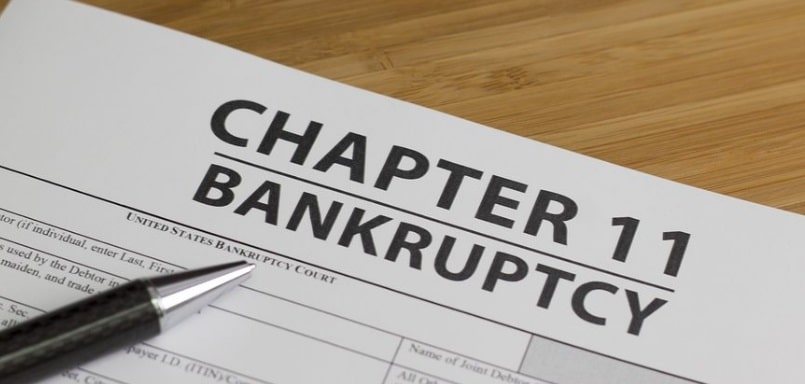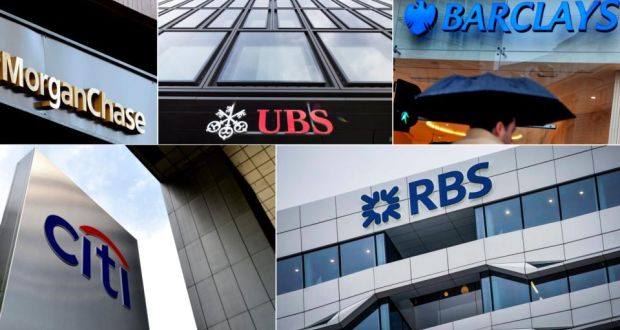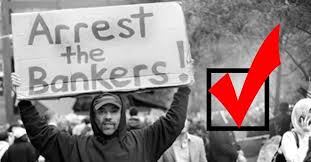Bankers and Brokers!? Can’t live with them; can’t live without them! We are constantly told by these financial service providers that “Trust” is their middle name and that, without it, they could never operate and serve our interests, as best they could. Yet, for the past decade, the banking and brokerage industry has been beset with scandals, fraud, and frontal attacks from regulatory agencies. Fines and bankruptcies have followed, while the honest and ethical purveyors among them (Yes, they are not all bad!) have looked on with scorn and derision. Has the definition of “Trust” changed?
Headline stories for the past few weeks, once again, have resurrected how treacherous and downright slimy many of our most respected financial institutions have become, while pursuing our undying loyalty. Tales of protection from creditors via bankruptcy petitions, more fine levies that would choke a horse, and even a few prosecutions of individuals from within these nefarious institutions have led to interesting reading. How does one avoid these pitfalls at every turn? Due diligence and constant awareness of changing behavior can work wonders, but you must always have a “Plan B”, just in case.
The top five stories in this genre include bankruptcy, banking fines, prosecutions, and a shift in regulatory responsibility in the binary options space, each one worthy of a quick read. Declining volumes, in the midst of increased competition and new regulatory compliance regimens, are driving much of the activity of late, but industry consolidation is at the heart of the matter. Hopefully, all will be better, once a new equilibrium prevails.

Storyline #1: GLBR, i.e., FXCM, reorganizes under bankruptcy statutes
The ongoing struggles of FXCM to survive and thrive after being summarily excommunicated from the U.S. by the CFTC have grabbed headlines in the financial press for the past year. As we noted back in August, “Success stories in the forex space have been few and far between of late, but the FXCM storyline has been emblematic of how things can go from bad to worse, even for a major player traded publicly on a stock exchange.” Despite losing its stateside presence, FXCM’s international client base was formidable, but its recovery from the infamous Swiss Franc Debacle has been torturous and problematic.
Why the need for bankruptcy protection? When last we visited this storyline, “In order to emphasize the global nature of the firm, FXCM, Inc. has re-branded its efforts going forward and will now go by the name of Global Brokerage Inc. and trade under the symbol of “GLBR”. GLBR has offices in London, Europe, and Australia and an Introducing Broker (IB) network that spans the globe, as well. GLBR owns 51% of the Retail FXCM operating entity, and it is the shares of GLBR that fell 26% on fears that the firm’s shares will soon be de-listed from the NASDAQ.”
The news now is that GLBR has received a delisting notice from the NASDAQ, a move that triggered several loan agreements that stipulated that immediate payments must be made. Liquidity to support these requirements is non-existent within the GLBR holding company, thereby necessitating the need for protection while loan covenants are renegotiated, if possible. The retail FXCM unit, however, continues to perform admirably, a fact that was emphasized in the press when damage control ensued.
Debt covenant renegotiations are not the only issue plaguing the FXCM franchise. There is also the matter of “mega” class-action lawsuits that have been filed on behalf of irate stockholders of GLBR, the actual entity that had traded on the New York Stock Exchange. A host of executives have exited stage left, due to reorganization plans, many of whom had been implicated in legal briefs that have been filed.
Comments from the new executive team, however, seem simply rosy: “We are very pleased that Global Brokerage has pursued a path that, in relatively short order, will resolve the uncertainties relating to its future. We believe that the Restructuring is a very positive thing for FXCM that will allow the firm to put to rest any remaining uncertainties surrounding its ability to drive forward and continue to plan for the future following the changes in early 2017.” Could a sale of FXCM be in the offing? Time will tell.
Storyline #2: More Big Bank fines, this time in the UK
Some have called it the greatest scandal in the foreign exchange industry in history, but justice in the forex rate-fixing arena has been slow and painful. Proving wrongdoing can be difficult for prosecutors, but the normal result of these proceedings has been to ignore the prosecution route and opt for the “slap-on-the-wrist” approach. Our modern bankers, at least the executive crew at the top, have found a way to avoid jail time. They need only pay over a small portion of their ill-gotten gelt, and all will be forgiven and forgotten.
There is only one little nagging problem, however. Each national regulatory arm under this carefully crafted process is allowed to a have a go at these thieves, one after the other, something attuned to a protracted negotiation over the appropriate level of fine that will be assessed. Regulators are permitted to publish outrageous numbers in the press, but every player in this game knows that the highly touted figures will soon be slashed down to something more palatable by the banking establishment. Under this scenario, fines are just another cost of doing business from a banking perspective.
The latest round of negotiations to be made public was in Europe, where the Financial Times reported that, “Several of the world’s leading banks (UBS, RBS, JPMorgan, Citigroup, Barclays, and HSBC) are heading towards final negotiations on a financial settlement (read: fines) with the European Commission, following a more than four year long probe into allegations they formed a cartel to rig the $5 trillion global FX market.” The expectation is that billions in Euros will be the final figure, but further details were not forthcoming.

Similar investigations by U.S., UK and Swiss authorities have resulted in over $10 billion in fines for offenses in this forex probe, alone. In case you are curious, a report from the Boston Consulting Group has stated that, “Financial institutions have paid more than $320 billion in penalties since 2008.” That figure may sound astronomical, but it only represents one year’s worth of illicit profits drained from the system and at our expense. The other $2.9 trillion of ill-gotten gains remain in banking coffers to pay enormous bonuses and dividends to banking management and shareholders. Greed pays well!
Storyline #3: Big Banks down under are not immune from the wrath of regulators
While the various forex and LIBOR rate fixing scandals were grabbing headlines in the Northern Hemisphere, there was very little that suggested that perhaps “contagion” had spread to the “land down under”. It now appears that Australia has not been immune after all. ASIC, sometimes accused of being in cahoots with big banks in the region, finally levied a few fines of its own: “ANZ and NAB fined $10 million each for ‘unconscionable conduct’ in setting of the Bank Bill Swap Rate.”
ASIC will not win wide approval for these actions. Most members in the Aussie press have often condemned the agency for handing out paltry fines to its banking brethren, an outright insult in some circles and certainly not in line with the billions noted in Europe and elsewhere. One reporter’s disgruntled conclusion read as follows: “Should Australian investors, taxpayers and the public be “shocked, dismayed and disgusted” as the judge suggested? Yes. But recent history suggests that the largest banks will just try to tough it out before returning to their previous modus operandi. Only a royal commission into banking regulation will break this vicious circle.”
Storyline #4: Believe it or not, some bankers have gone to jail for their sins
In late 2015, global bankers began to shake a bit in their boots, when Icelandic authorities jailed nearly thirty bankers for their sins. The press report at the time seemed poignant: “Just before Christmas, the former CEO of Iceland’s Glitnir bank and two other senior bankers were sentenced to jail terms of up to five years for market manipulation and breach of fiduciary duties. This brings the total number of senior Icelandic bankers so far sentenced for crimes in the run-up to the 2008 banking crash to 29.”

If arresting bankers in Iceland led to an economic recovery, why haven’t other jurisdictions, like the U.S., the UK and Europe, followed suit? While no executive has gone to jail for mortgage-backed securities, the primary cause for the previous financial meltdown, there have been other legal proceedings that have received little, if any, coverage. The majority of prosecutions relate to the miss-use of bailout proceeds, but there have been convictions. Here are two summaries of note:
- UK Summary: Number of people charged by UK authorities: 28; Number of people convicted: 5; Number of cases yet to be decided: 15
- US Summary: 402 individuals facing criminal charges, including 97 bankers charged with fraud. Wall Street traders were also charged; 324 people being convicted, of whom 222 were sentenced to prison.
The wheels of justice may turn slowly, but the threat of “due process” may still hang over the heads of our banking leaders across the globe. Will they heed the warnings or continue their evil ways? Do not hold your breath on that one.
Storyline #5: FCA finalizes when responsibility for binary options will shift to them
Fraud, deception, and shady business practices seem to have become the new normal in the world of binary options. Regulators, after a long hibernation, are finally beginning to act. In the UK, the FCA announced that, “Effective January 3, 2018, firms offering binary options in the UK will be regulated by the FCA, and will no longer be licensed by the Gambling Commission.” The Gambling Commission never truly regulated binary options, since offending brokers did not have equipment in the UK, only online websites. 2018 will be a turning point for binary options.
Concluding Remarks
The lesson of the past decade has been that, when push comes to shove, bankers and brokers will resort to any maneuver necessary to ensure their survival, even if it means cheating and defrauding its immense customer base. What is worse is that these leaders in the public domain profess to have our best interests at heart, but, when challenged, refuse to change their fraudulent practices and continue to push the edges of their envelopes of greed. Being too big to fail or jail is the anathema of our times.
Related Articles
- Forex vs Crypto: What’s Better For Beginner Traders?
- Three Great Technical Analysis Tools for Forex Trading
- What Does Binance Being Kicked Out of Belgium Mean for Crypto Prices?
- Crypto Traders and Coin Prices Face New Challenge as Binance Gives up its FCA Licence
- Interpol Declares Investment Scams “Serious and Imminent Threat”
- Annual UK Fraud Audit Reveals Scam Hot-Spots
Forex vs Crypto: What’s Better For Beginner Traders?
Three Great Technical Analysis Tools for Forex Trading
Safest Forex Brokers 2025
| Broker | Info | Best In | Customer Satisfaction Score | ||
|---|---|---|---|---|---|
| #1 |
|
Global Forex Broker |

BEST SPREADS
Visit broker
|
||
| #2 |
|
Globally regulated broker |

BEST CUSTOMER SUPPORT
Visit broker
|
||
| #3 |
|
Global CFD Provider |

Best Trading App
Visit broker
|
||
| #4 |
|
Global Forex Broker |

Low minimum deposit
Visit broker
|
||
| #5 |
|
Global CFD & FX Broker (*Don’t invest unless you’re prepared to lose all the money you invest. This is a high-risk investment and you should not expect to be protected if something goes wrong. Take 2 mins to learn more) |

ALL-INCLUSIVE TRADING PLATFORM
Visit broker
|
||
| #6 |
|
Global Forex Broker |

Low minimum deposit
Visit broker
|
||
| #7 |
|
CFD and Cryptocurrency Broker |

CFD and Cryptocurrency
Visit broker
|
||
|
|
|||||
Forex Fraud Certified Brokers
Stay up to date with the latest Forex scam alerts
Sign up to receive our up-to-date broker reviews, new fraud warnings and special offers direct to your inbox


